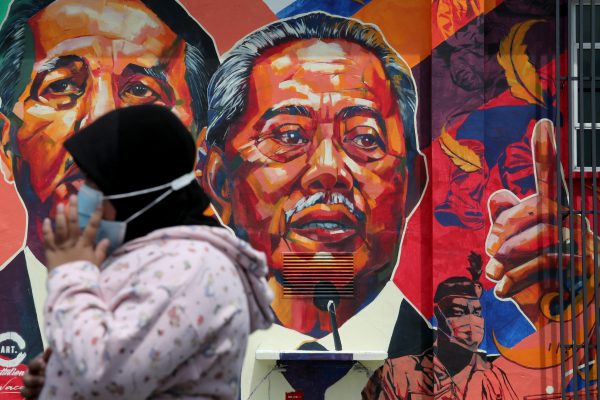In January 2020, the 22-month-old Pakatan Harapan (Alliance of Hope) government fell in ignominious style. Defectors from its coalition partners, Bersatu (United Indigenous Malay Party) and PKR (People’s Justice Party) — the respective vehicles of the former prime minister Mahathir Mohamad and leadership hopeful Anwar Ibrahim — abandoned Pakatan Harapan to join UMNO (United Malays National Organisation) and PAS (Pan-Malaysian Islamic Party). Together, they forged a new ‘backdoor government’, labelled Perikatan Nasional (National Alliance). Bersatu’s president Muhyiddin Yassin ascended to the prime ministership.
Malaysia was struck at the same time by the COVID-19 pandemic. The Health Ministry temporarily contained the virus, though at the cost of steep lockdown and economic shrinkage. The country’s lifeline to China was also frayed by the slow motion collapse of various PRC-backed megaprojects.
Amid the pandemic, Muhyiddin’s prime ministership was challenged by both Mahathir and Anwar, who sought their own backdoor routes to office. Mahathir broke from Pakatan Harapan, but failed to register his new nativist party, Pejuang Tanah Air (Homeland Fighters). Anwar’s reformist sheen was dulled after he unsuccessfully tried to entice UMNO party president Zahid Hamidi and the former UMNO prime minister Najib Razak to join Pakatan while both men were battling corruption charges.
Muhyiddin responded by tightening controls over civil liberties and parliament, even moving to impose emergency rule. While he was initially rebuffed by the Council of Rulers — made up of Malaysia’s hereditary sultans and rajas, whose approval the Constitution required — Muhyiddin eventually gained their assent in January 2021.
Even so, UMNO factions have sought continuously to subvert Muhyiddin’s leadership. The party smoulders over its backseat role in the Perikatan Nasional government, in which it has been subordinated to Muhyiddin’s Bersatu party. Even as a deadly wave of COVID-19 infections gathered force, a series of factional tit-for-tats raged across the political terrain.
What are the main takeaways from this series of events?
First, we see towering barriers in Malaysia to democratic change and good governance agendas. The country is beset by elite-level rivalries, a single-minded pursuit of patronage, general economic stagnancy, and successive waves of a worsening pandemic. But society also seems generally indifferent to restraining the behaviours of its leaders. Mass-level communities, stubbornly defined by ethno-religious markers, remain engaged in intense segmental battling over their relative status and distributive benefits.
Thus, despite the historic general election in 2018, little progress through ‘democratisation-by-elections’ has been made by reformist politicians and civil society. The government has failed to advance the Malaysia Baharu (New Malaysia) vision through greater popular participation, ethno-religious equality, policy effectiveness and alignment with progressive international norms.
Rather, the country’s hybrid regime, a fusion of democratic procedures and authoritarian controls, has withstood electoral turnover, the ouster of an elected government, the inability of a long extant single-party dominant system to re-equilibrate, and the havoc wreaked by COVID-19. This experience evokes the intrinsic resilience that this regime type can attain, now reinforced through emergency rule.
Second, while personal and factional skirmishing were always hallmarks of UMNO’s rule, such dealings greatly accelerated as the party weakened. As Malaysia’s long single-party dominant system fragmented, a new mode of power transfer took root. Rather than parties selecting candidates, campaigning for elections and mobilising voters, leaders have competed stealthily for the loyalties of parliamentary defectors and a mastery over back channels to state patronage.
Third, one is struck by the reordering of time-honoured elite standings. We see the sharp diminution of Mahathir Mohamad, labouring in the ill-lit margins that his new party now inhabits. Anwar Ibrahim’s path to the prime ministership seems likely to have reached a dead end as he has sacrificed his reformist imagery and alienated Pakatan Harapan supporters without locking in support from UMNO operatives.
Meanwhile, we have seen the populist recrudescence of Najib Razak, despite his many court cases and convictions, as well as the revival of veteran UMNO leader Tengku Razaleigh. These adjustments in elite-level statuses are meaningful in Malaysia’s political life, for it grows more personalised, factionalised and fluid.
The fragmentation of Malaysia’s single-party dominant system also correlates with an astonishing royal revival. Malaysia’s monarch, known by the title Agong, in his new paramountcy as king maker, anointed Muhyiddin as a prime minister then turned down similar bids made by Mahathir and Anwar. The Council of Rulers, in refusing Muhyiddin’s subsequent plea for emergency powers, capped the prime minister’s political writ, thereby broadening its own. But as Muhyiddin suddenly lost his parliamentary majority amid UMNO defections, the Agong reconsidered and approved Muhyiddin’s second appeal for emergency rule.
Yet Malaysia appeared to remain steady, at least until mid-January 2021. Key pillars of state strength seemed to hold, most urgently the country’s public health facilities and logistics systems. But then a third wave of COVID-19 hit, suddenly overwhelming hospitals and quarantine facilities. The government reimposed a tight movement control order on 11 January.
It was after several UMNO parliamentarians withdrew support for Perikatan Nasional the next day that Muhyiddin returned to the Agong for approval over emergency rule. The Agong obliged him with a Proclamation of Emergency. Near lockdown was imposed in six states and the federal territories, then extended across the whole country until at least 4 February.
Meanwhile, the state of emergency will remain in effect until 1 August, suspending parliament and elections, equipping the military with policing powers and empowering the prime minister to seize ‘assets and resources’. Uncertainty looms over whether the time frames of either the lockdown or the Emergency will be adjudged by the Agong and prime minister to be enough.
William Case is Professor and Head of the School of Politics, History and International Relations at the University of Nottingham Malaysia.
This article is part of an EAF special feature series on 2020 in review and the year ahead.

